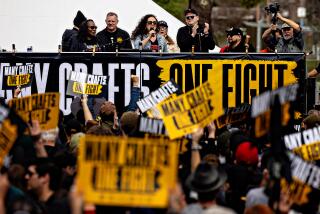PACIFIC PERSPECTIVE : ‘Asian Miracle’ Finds Unions on the March : As the boom continues, governments can no longer ignore demands by workers for decent pay and conditions.
- Share via
Two years ago the streets of Beijing were beginning to resound to protests of the democracy movement. A major factor leading up to the massacre in Tian An Men Square was the flowering of autonomous workers federations in major Chinese cities.
Dealing with protesting students required firmness, but a pro-democracy revolt by workers against communist rule had to be crushed without mercy. The historic basis of communist rule anywhere is that the Communist Party acts all-knowingly in the name of the working class.
In 1980 the uprising by Polish workers and the formation of their independent union, Solidarity, stripped away the lingering pretensions that East European communist regimes represented workers’ interests.
The fear that Chinese workers might, as it were, teach themselves Polish led Deng Xiaoping to send the tanks into Tian An Men Square and crush the fledgling independent trade-union movement coming into being as part of the wider pro-democracy protests.
Other Asian governments have been desperately trying to keep a lid on the growing demands for independent trade-union activity.
Along with spectacular industrialization, many Asian countries have generated an industrial working class, urban-based and working long hours in textile, metal, electronic and auto-component assembly plants.
Other than in Japan and Singapore, these workers tend to be badly underpaid--they can rarely buy the products of their labor. They also suffer a multitude of workplace privations, from poor safety protection to overbearing foremen--which in industrialized countries in Europe and North America are sorted out by independent trade unions.
Hence the spectacular boom in trade-union activity in Asia.
In the past 24 months Asia has seen:
-- Continuing strikes and trade-union organization in South Korea.
-- The launch of a democratic trade union called Solidarity in Indonesia.
-- The formation of an independent trade-union confederation in Hong Kong, rejecting the tutelage of both the Beijing and Taiwan regimes.
-- New unions launched in Taiwan, after the limited move to democracy by the Kuomintang (Nationalist Party) rulers there.
-- Vigorous, if so far unsuccessful, attempts in the United States to remove duty-free benefits from Malaysia under the Generalized System of Preferences, because of the denial of international trade-union rights to electronics workers by Malaysia’s Prime Minister Mahathir Mohammed.
The most significant change helping to promote the interest in Asian workers and their unions is the end of the Cold War. As recently as 10 years ago, opposition trade unionists were branded, fairly or unfairly, as communists, with a political, ideological agenda opposed to democracy and the market economy.
This is no longer the case, even if, naturally enough, anti-capitalist language features in much labor rhetoric. Electronics workers in Malaysia, Daewoo employees in Korea, textile workers in Indonesia or plastic toy makers in Taiwan want the same kind of rights that their counterparts have in democratic, free-market economies.
Labor ministers in Asia place much hope in what they think is a Japanese model of labor-management harmony based on company unions--but they forget that the material basis for this has been 30 years of a steadily rising living standard expressed through real wage increases for Japanese workers.
Japanese unions, moreover, despite their company links, still operate as independent agents in a plural society. They actively intervene in politics, backing opposition socialist parties and behaving, albeit in a discreet Japanese fashion, in a manner that would render most Asian leaders apoplectic.
Temporary measures of repression, such as the ban on labor activity decreed by the new military junta in Thailand, may stem the rising tide of worker organization here and there, but workers’ movements promise to persist.
The demands put forward two years ago by the autonomous workers federation in Tian An Men Square for independent trade unions, respect for international labor rights and fairer economic and environmental treatment in the workplace will not go away--not just in China but throughout industrializing, exporting Asia.
More to Read
Sign up for Essential California
The most important California stories and recommendations in your inbox every morning.
You may occasionally receive promotional content from the Los Angeles Times.










